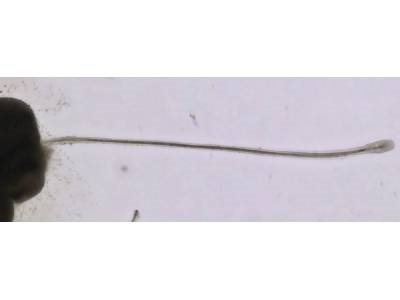
A representative long sprouting hair follicle generated from hair follicloids after an extended period of culture. Credit: Yokohama National University
Understanding the mechanisms behind hair follicle development could aid in the treatment of disorders such as androgenic alopecia. Researchers have long used animal models to study hair follicle development, but the ability to generate these unique organs in vitro would allow for closer monitoring of hair growth processes, as well as enable more efficient drug screenings without the use of lab animals. A team led by Yokohama National University researchers has now successfully grown fully mature hair follicles in culture, opening up new avenues for studying follicle morphogenesis, hair regeneration and more.
In developing embryos, hair follicles form through interactions between epidermal and mesenchymal layers. In order to generate hair follicle organoids, the researchers prepared a culture with a low concentration of extracellular matrices in order to encourage similar interactions between embryonic epithelial and mesenchymal cells. By adjusting the spatial distribution of these two cell types, the researchers found the cells self-assembled into “core-shell” configurations, which increased the contact area between the two cell regions and facilitated the growth of mature hair follicles. This organoid culture system resulted in the formation of hair follicles and hair shafts with almost 100% efficiency, with hair shafts reaching lengths of approximately 3 mm after 23 days of culture.
As the follicles and shafts formed in vitro, the team was able to monitor the signaling pathways involved in the processes of follicle morphogenesis and hair pigmentation. The researchers further studied the ability to use their hair follicle organoids for drug screening and regenerative medicine; they added a melanocyte-stimulating drug to the culture medium and found that pigmentation of the hair-like fibers significantly improved. Additionally, by transplanting the organoids, they were able to achieve efficient hair follicle regeneration with repeating hair cycles. This study was published in Science Advances.
“Our next step is to use cells from human origin, and apply for drug development and regenerative medicine,” said study co-author Junji Fukuda, a professor with the faculty of engineering at Yokohama National University.
The in vitro model offers a promising alternative to animal models and is expected to further understanding of hair follicle induction, hair pigmentation and potential treatments for hair loss disorders.